- Home
- David Gemmell
The King Beyond the Gate Page 6
The King Beyond the Gate Read online
Page 6
Tenaka fell to the snow, dropping his sword. He rolled to his feet instantly to face the wounded man, who was standing now and smiling. There was no trace of wounds on his blue tunic or his body.
“What the devil is happening here?” demanded Tenaka.
The man shimmered and vanished. Tenaka swung to Renya, who was standing wide-eyed and staring at the tree.
“Someone played us for fools,” said Tenaka, brushing snow from his tunic.
“But why?” asked the girl.
“I don’t know. Let us away. The forest has lost its magic.”
“They were so real,” said Renya. “I thought we were finished. Were they ghosts, do you think?”
“Who knows? Whatever they were, they left no tracks, and I have little time for such mysteries.”
“But there must have been a reason,” she persisted. “Was it done just for us?”
He shrugged, then helped her up the steep incline back to their camp.
Forty miles away four men sat silently in a small room, their eyes closed and their minds open. Then, one by one, they opened their eyes, leaning back in their chairs and stretching as if awakening from deep sleep.
Their leader, the man who had appeared to be under attack in the clearing, stood and walked to the narrow stone window, gazing out over the meadow below.
“What do you think?” he asked without looking around. The other three exchanged glances, and then one, a short stocky man with a thick yellow beard, said, “He is worthy at least. He did not hesitate to aid you.”
“Is that important?” asked the leader, still gazing from the window.
“I believe it is.”
“Tell me why, Acuas.”
“He is a man with a mission, yet he is a humanist. He was willing to risk his life—no, throw it away—rather than let a fellow human suffer alone. Light has touched him.”
“What do you say, Balan?”
“It is too early for judgments. The man may just be rash,” answered a taller, slimmer man with a shock of dry curly hair.
“Katan?”
The last man was slender, his face long and ascetic, his eyes large and sorrowful. He smiled.
“Were it my choice, I would say yes. He is worthy. He is a man of the Source, although he knows it not.”
“Then we are—in the main—agreed,” said the leader. “I think it is time we spoke with Decado.”
“But should we not be more sure, Lord Abbot?” asked Balan.
“Nothing in life is sure, my son. Except the promise of death.”
5
It was an hour past curfew, and the streets of Drenan were deserted, the vast white city silent. A three-quarter moon hung in a clear sky, its reflection glinting from a thousand rain-washed cobbles on the Street of Pillars.
From the shadows of a tall building came six men in black armor, dark helms covering their faces. They walked swiftly, purposefully toward the palace, looking neither to right nor left.
Two Joinings armed with massive axes barred their path, and the men stopped. Six pairs of eyes fastened on the beasts, and they howled in pain and fled.
The men walked on. From behind shutters and heavily curtained windows eyes watched their progress, and the marchers felt the stares, sensing the curiosity turning to fear as they were recognized.
They moved on in silence until they reached the gates, where they waited. After several seconds they heard the grating movement of the bar beyond, and the gate opened. Two sentries bowed their heads as the black-armored men marched forward across the courtyard and on into the main torchlit corridors lined with guards. All eyes avoided them. At the far end the double doors of oak and bronze slid open, the leader raised his hand, and his five companions halted, turning on their heels to stand before the doors with black-gloved hands resting on ebony sword hilts.
The leader lifted his helm and entered the room beyond.
As he had expected, Ceska’s chief minister, Eertik, waited alone at his desk. He looked up as the warrior appeared, his dark, heavy-lidded eyes fixing on the knight.
“Welcome, Padaxes,” he said, his voice dry and faintly metallic.
“Greetings, counselor,” Padaxes answered, smiling. He was a tall man, square-faced, with eyes the gray of a winter sky. His mouth was full-lipped and sensual, yet he was not handsome. There was about his features a strangeness, a taint hard to define.
“The emperor has need of your services,” said Eertik. As he stood and moved around the desk of oak, his dark velvet garments rustled. Padaxes registered the sounds, considering them not dissimilar to a snake moving through dry grass. He smiled again.
“I am always at the emperor’s command.”
“He knows that, Padaxes, just as he knows you value his generosity. There is a man who seeks to harm the emperor. We have had word that he is in the north, and the emperor wishes him taken or slain.”
“Tenaka Khan,” said Padaxes.
Eertik’s eyes opened wide in surprise. “You know of him?”
“Obviously.”
“May I ask how?”
“You may not.”
“He is a threat to the empire,” said Eertik, masking his annoyance.
“He is a walking corpse from the moment I leave this room. Did you know that Ananais was with him?”
“I did not,” said Eertik, “although now you say it, I understand the mystery. Ananais was thought to be dead of his wounds. Does this intelligence pose a problem for your order?”
“No. One, two, ten, or a hundred. Nothing can stand against my Templars. We will ride in the morning.”
“Can I aid you in any way?”
“Yes. Send a child to the temple in two hours. A girl child under ten years. There are certain religious rites which must be performed. I must commune with the power that holds the universe.”
“It shall be done.”
“Our temple buildings are in need of repair. I was considering a move to the country and the commissioning of a new temple—something larger,” said Padaxes.
“The emperor’s thoughts exactly,” said Eertik. “I will have some plans drawn up for your return.”
“Convey my thanks to the lord Ceska.”
“I will indeed. May your journey be swift and your return joyful.”
“As the spirit wills it,” Padaxes answered, replacing his black helm.
From his high tower window the abbot gazed down into the upper garden, where twenty-eight acolytes knelt before their trees. Despite the season, the roses thrived, the perfume of their blooms filling the air.
The abbot closed his eyes and soared, his spirit rising and flowing. Gently he descended to the garden, coming to rest beside the slender Katan.
Katan’s mind opened to receive him, and the abbot joined the acolyte, flowing within the fragile stems and capillary systems of the plant.
The rose welcomed them. It was a red rose.
The abbot withdrew and, one by one, joined each of the acolytes in turn. Only Balan’s rose had failed to flower, but the buds were full and he was but a little way behind the rest.
The abbot returned to his body in the high tower, opening his eyes and breathing deeply. He rubbed his eyes and moved to the southern window, looking down to the second level and the vegetable garden.
There, kneeling in the soil, was a priest in a dirty brown cassock. The abbot walked from the room, descending the circular stair to push open the door to the lower level. He stepped out onto the well-scrubbed flagstones of the path and descended the stone steps to the garden.
“Greetings, Brother,” he said.
The priest looked up, then bowed. “Greetings, Lord Abbot.”
The abbot seated himself on a stone bench nearby.
“Please continue,” he said. “Do not let me disturb you.”
The man returned to his work, weeding the soil, his hands black with dirt and his fingernails cracked and broken.
The abbot looked about him. The garden was well tended, the tools shar
p and cared for, the pathways clean and clear of weeds.
He gazed fondly on the priest. The man had changed greatly since that day five years earlier when he had walked into the monastery declaring his wish to become a priest. Then he had been dressed in garish armor, two short swords strapped to his thighs and a baldric belt across his chest bearing three daggers.
“Why do you wish to serve the Source?” the abbot had asked.
“I am tired of death,” he had replied.
“You live to kill,” the abbot had said, staring into the haunted eyes of the warrior.
“I want to change.”
“You want to hide?”
“No.”
“Why did you choose this monastery?”
“I … I prayed.”
“Did you receive an answer?”
“No. But I was heading west, and after praying I changed my mind and came north. And you were here.”
“You think that is an answer?”
“I don’t know,” the warrior had answered. “Is it?”
“Do you know what order this is?”
“No.”
“The acolytes here are gifted beyond other men, and they have powers you could not comprehend. Their whole lives are given over to the Source. What do you offer?”
“Only myself. My life.”
“Very well. I will take you. But hear this and mark it well. You will not mix with the other acolytes. You will not walk to the upper level. You will live below in a crofter’s hut. You will put aside your weapons and never touch them again. Your tasks will be menial, and your obedience total. You will not speak to anyone at any time—only when I address you may you answer.”
“I agree,” the warrior had said without hesitation.
“I will instruct you each afternoon, and I will gauge your progress. If you fail in any way, I will dismiss you from the monastery.”
“I agree.”
For five years the warrior had obeyed without question, and as the seasons had passed, the abbot had watched the haunted expression fade from his dark eyes. He had learned well, though never could he master the release of the spirit. But in all other things the abbot was pleased.
“Are you happy, Decado?” the abbot asked now. The priest leaned back and turned.
“Yes, Lord Abbot.”
“No regrets?”
“None.”
“I have news of the Dragon,” said the abbot, watching him carefully. “Would you care to hear it?”
The priest looked thoughtful. “Yes, I would. Is that wrong?”
“No, Decado, it is not wrong. They were your friends.”
The priest remained silent, waiting for the abbot to speak.
“They were wiped out in a terrible battle by the Joinings of Ceska. Although they fought valiantly and well, they could not stand against the power of the beasts.”
Decado nodded and returned to his work.
“How do you feel?”
“Very sad, Lord Abbot.”
“Not all your friends perished. Tenaka Khan and Ananais have returned to the Drenai, and they plan to kill Ceska, to end his terror.”
“May the Source be with them,” said Decado.
“Would you like to be with them?”
“No, Lord Abbot.”
The abbot nodded. “Show me your garden,” he said. The priest rose, and the two men walked among the plants, coming at last to the tiny hut that housed Decado. The abbot walked around the outside. “You are comfortable here?”
“Yes, Lord Abbot.”
Behind the hut the abbot stopped, staring down at a tiny bush and the single flower that grew there.
“And what is this?”
“It is mine, Lord Abbot. Have I done wrong?”
“How did you come by it?”
“I found a seedpod someone had thrown from the upper level, and I planted it three years ago. It’s a beautiful plant; it usually flowers much later.”
“Do you spend much time with it?”
“When I can, Lord Abbot. It helps me relax.”
“We have many roses on the upper levels, Decado. But none of this color.”
It was a white rose.
Two hours after dawn Ananais returned to the campsite, bringing with him Valtaya, Scaler, and Belder. Tenaka watched them approach. The older man, he could see, was a veteran who moved carefully, hand on sword hilt. The woman was tall and well made, and she stayed close to the black-garbed Ananais. Tenaka grinned and shook his head. Still the Golden One, he thought. But the young man was interesting. There was about him something familiar, yet Tenaka was sure they had never met. He was athletic and tall, clear-eyed and handsome, and his long dark hair was held in place by a black metal circlet adorned with an opal at the center. He wore a leaf-green cloak and calf-length brown walking boots. His tunic was of soft leather, and he carried a short sword in his hand. Tenaka sensed his fear.
He stepped from the trees to greet them.
Scaler looked up as he appeared. He wanted to rush forward and embrace him but resisted the urge. Tenaka would never recognize him. The Nadir prince had changed little, he thought, save for the few gray hairs glinting in the sunlight. The violet eyes were still piercing, the stance still unconsciously arrogant.
“You cannot resist surprises, my friend,” said Tenaka.
“So true,” answered Ananais. “But I have breakfast in the pack, and explanations can wait until I have eaten.”
“Introductions cannot,” said Tenaka softly.
“Scaler, Valtaya, and Belder,” Ananais said, waving an arm at the trio. With that he strode past Tenaka and on toward the fire.
“Welcome!” said Tenaka lamely, spreading his hands.
Scaler walked forward. “Our presence in your camp is temporary,” he said. “Your friend helped Valtaya, and it was vital that we leave the city. Now that she is safe, we shall return.”
“I see. Join us for food first,” offered Tenaka.
The silence around the fire was uncomfortable, but Ananais ignored it, taking his food to the edge of the trees and sitting with his back to the group so that he could remove his mask and eat.
“I have heard much of you, Tenaka,” said Valtaya.
He turned to her. “Much of what people say is untrue.”
“There is always a grain of truth at the center of such sagas.”
“Perhaps. Where did you hear the stories?”
“From Scaler,” she replied.
Tenaka nodded and turned to the young man, who was blushing furiously. “And where did you hear them, my friend?”
“Here and there,” replied Scaler.
“I was a soldier. Nothing more. My ancestry gave me fame. I could name many better swordsmen, better riders, better men. But they had no name to carry before them like a banner.”
“You are too modest,” said Scaler.
“It is not a question of modesty. I am half-Nadir of the line of Ulric and half-Drenai. My great-grandfather was Regnak, the Earl of Bronze. And yet I am neither earl nor khan.”
“The Khan of Shadows,” said Scaler.
“How did such a thing come about?” asked Valtaya.
Tenaka grinned. “It was the Second Nadir War, and Regnak’s son Orrin made a treaty with the Nadir. Part of the price was that his son, Hogun, should marry the khan’s daughter, Shillat. It was not a marriage of love. It was a grand ceremony, I am told, and the union was consummated near the Shrine of Druss on the northern plain before Delnoch. Hogun took his bride back to the fortress, where she dwelled unhappily for three years. I was born there. Hogun died in a riding accident when I was two, and his father sent Shillat home. It was written into the marriage contract that no child of the union could inherit Dros Delnoch. And as for the Nadir, they desired no half-breed to lead them.”
“You must have been very unhappy,” said Valtaya.
“I have known great joys in my life. Do not feel pity for me, lady.”
“How did you come to be a Dragon general
?”
“I was sixteen when the khan, my grandfather, sent me to Delnoch. Again it was part of the marriage contract. My other grandfather was there to greet me. He told me he had arranged a commission in the Dragon. It is that simple!”
Scaler stared into the fire, his mind flowing back.
Simple? How could such a terrible moment be described as simple?
It was raining, he remembered, when the guard on the Eldibar tower sounded the trumpet. His grandfather Orrin had been in the keep, engaged in a war game with their guest. Scaler was perched on a high chair, watching them roll the dice and move the tiny regiments, when the trumpet call echoed eerily in the storm winds.
“The Nadir spawn has arrived,” said Orrin. “He picked the right day for it.”
They dressed Scaler in a cloak of oiled leather and a wide-brimmed leather hat, then began the long walk to Wall One.
Once there, Orrin gazed down on the twenty riders and the dark-haired youth on the white shaggy pony.
“Who seeks entry to Dros Delnoch?” called Orrin.
“The son of Shillat,” yelled the Nadir captain.
“He only may enter,” said Orrin.
The great gates creaked open, and the Nadir troop wheeled their mounts, riding swiftly back to the north.
Tenaka did not turn to watch them go, and no word passed between them. The youth touched his heels to the pony and cantered into the gate tunnel and up onto the green field between walls One and Two. There he slid from the saddle and waited for Orrin to approach.
“You are not welcome here,” said Orrin, “but I will stand by my bargains. I have arranged a commission in the Dragon, and you will leave in three months. Until then you will learn Drenai ways. I want no relative of mine eating with his fingers in the officers’ mess.”
“Thank you, Grandfather,” said Tenaka.
“Don’t call me that,” snapped Orrin. “Not ever! You will call me ‘my lord’ or, in company, ‘sir.’ Do you understand?”
“I believe that I do, Grandfather. And I shall obey you.” Tenaka’s gaze flickered to the child.
“This is my true grandson,” said Orrin. “All my children are dead. Only this little lad survives to continue my line. His name is Arvan.”
Tenaka nodded and turned to the dark-bearded man to Orrin’s left.

 Bloodstone
Bloodstone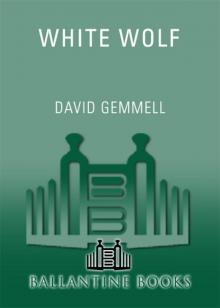 White Wolf
White Wolf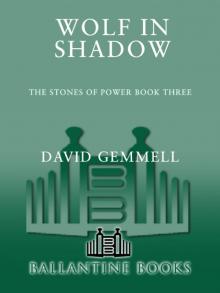 Wolf in Shadow
Wolf in Shadow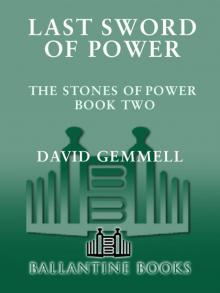 Last Sword of Power
Last Sword of Power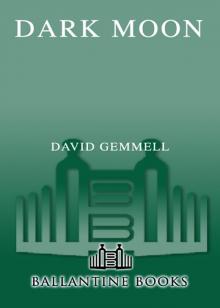 Dark Moon
Dark Moon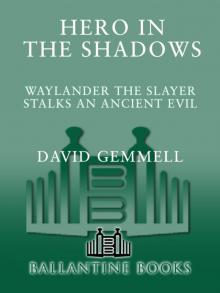 Hero in the Shadows
Hero in the Shadows Gemmell, David - Drenai 09 - Hero In The Shadows
Gemmell, David - Drenai 09 - Hero In The Shadows Waylander
Waylander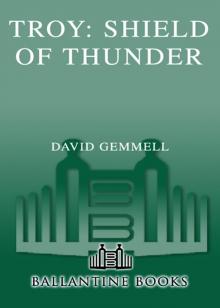 Shield of Thunder
Shield of Thunder Stormrider Stormrider
Stormrider Stormrider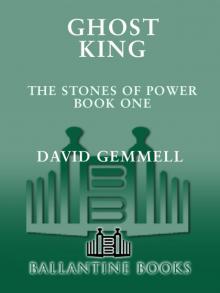 Ghost King
Ghost King Legend
Legend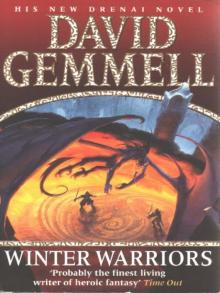 Winter Warriors
Winter Warriors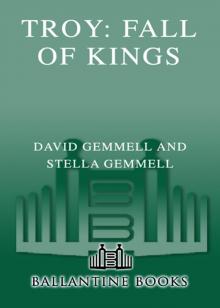 Fall of Kings
Fall of Kings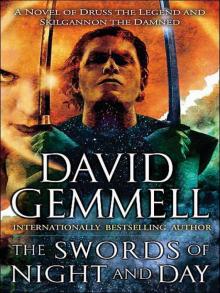 The Swords of Night and Day
The Swords of Night and Day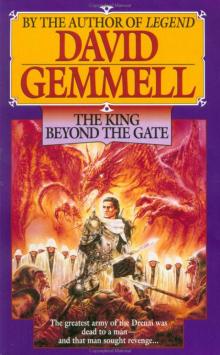 The King Beyond the Gate
The King Beyond the Gate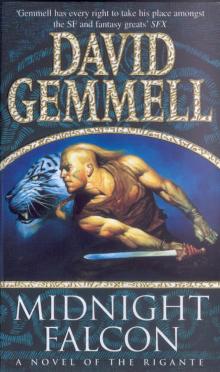 Midnight Falcon
Midnight Falcon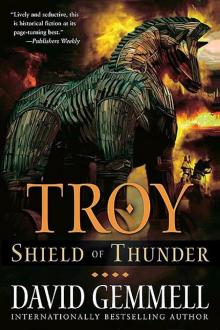 02 - Shield of Thunder
02 - Shield of Thunder In the Realm of the Wolf
In the Realm of the Wolf Ravenheart
Ravenheart The First Chronicles of Druss the Legend
The First Chronicles of Druss the Legend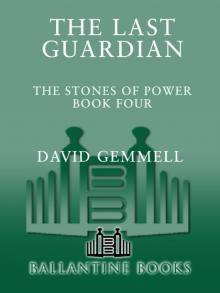 Last Guardian
Last Guardian Stormrider
Stormrider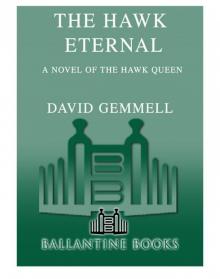 The Hawk Eternal
The Hawk Eternal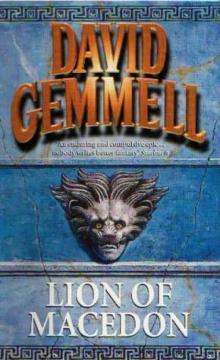 Lion of Macedon
Lion of Macedon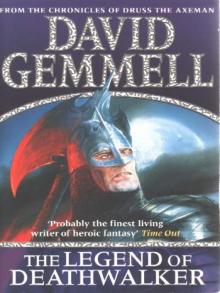 The Legend of Deathwalker
The Legend of Deathwalker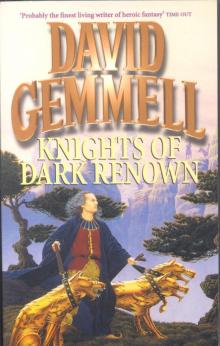 Knights of Dark Renown
Knights of Dark Renown Echoes of the Great Song
Echoes of the Great Song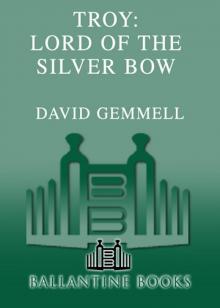 Lord of the Silver Bow
Lord of the Silver Bow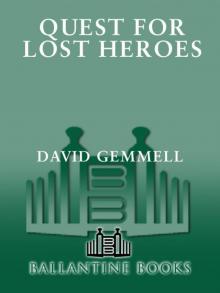 Quest for Lost Heroes
Quest for Lost Heroes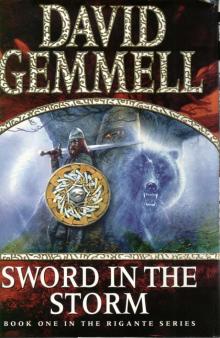 Sword in the Storm
Sword in the Storm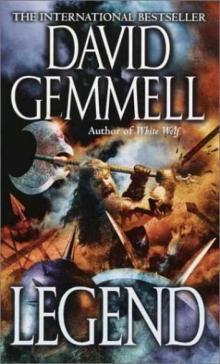 Drenai Saga 01 - Legend
Drenai Saga 01 - Legend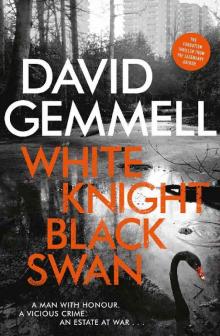 White Knight/Black Swan
White Knight/Black Swan![[Troy 02] - Shield of Thunder Read online](http://i1.bookreadfree.com/i/03/19/troy_02_-_shield_of_thunder_preview.jpg) [Troy 02] - Shield of Thunder
[Troy 02] - Shield of Thunder Lord of the Silver Bow t-1
Lord of the Silver Bow t-1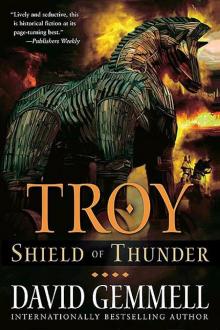 Shield of Thunder t-2
Shield of Thunder t-2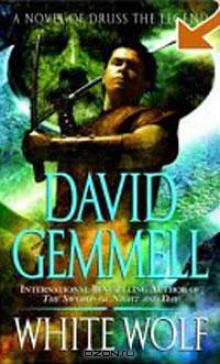 White Wolf: A Novel of Druss the Legend dt-10
White Wolf: A Novel of Druss the Legend dt-10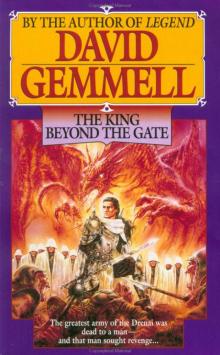 Drenai Saga 02 - The King Beyond the Gate
Drenai Saga 02 - The King Beyond the Gate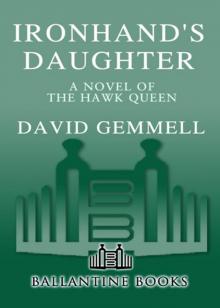 Ironhand's Daughter
Ironhand's Daughter Gemmell, David - Drenai 06 - The First Chronicles of Druss the Legend
Gemmell, David - Drenai 06 - The First Chronicles of Druss the Legend The Last Guardian
The Last Guardian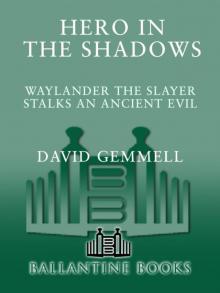 Hero in the Shadows: A Waylander the Slayer Novel
Hero in the Shadows: A Waylander the Slayer Novel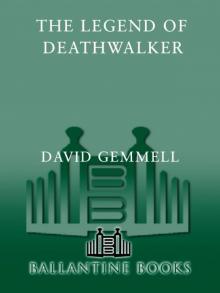 The Legend of the Deathwalker
The Legend of the Deathwalker